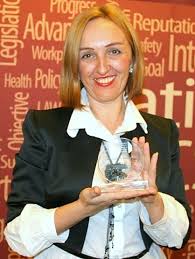Role of media information in managing mass emotions in social communications of modern Ukraine (a brief overview as a statement of the question)
DOI:
https://doi.org/10.17721/CIMC.2022.31.54-63Ключові слова:
соціальна комунікація; масові емоції; масова інформація; індивідуальна та масова інтерпретація в соціальних комунікаціяхАнотація
Мета дослідження – довести наявність в українських сучасних соціальних комунікаціях практичних спроб у керуванні третім компонентом масовокомунiкацiйного послання – масовоемоційним. Адже у попередніх дослідженнях авторка доводила, що в основі природи соціальних комунікацій в сучасному диджитальному соціумі лежить єдність масової інформації, масової інтерпретації та масових емоцій. Важливо віднайти реальні спроби організаторів певних політичних дискурсів керувати масовими емоціями в соціальних комунікаціях за допомогою медіа.
Головні висновки дослідження: підтвердилося наукове припущення щодо наявності в соціальних комунікаціях спроб керування масовими емоціями через аудіовізуальні та диджитальні вітчизняні ЗМК. В українських соціальних комунікаціях медіа мають ознаки використання комунікаційних технологій. Для того, щоб утворився рід колективної душі під час комунікації, комунікатори послуговуються традиційними медіа (телебачення та телешоу), адже вони забезпечують масову поінформованість у комунікаційному ланцюжку: зрозумілість знаку, зрозумілість тексту, всенародну інформованість через ЗМК, всенародну інтерпретацію, всенародне розуміння та розраховують на масову реакцію у вигляді масової емоції. Тому важливою є подальше завдання поглиблено дослідити наукову проблему функціонування масових емоцій у сфері соціальних комунікацій та глибше дослідити соціальні комунікації як сферу функціонування масових емоцій.
Методи, що були застосовні під час дослідження для досягнення мети, - метод контент-моніторингу, порівняння, узагальнення, аналізу текстів.
Завантажити
Посилання
Almost half of Ukrainians are concerned about Sternenko's lawsuit (2020, February 21), RBC.ua. https://www.rbc.ua/ukr/news/polovina-ukraintsev-obespokoeny-sudebnym-1614440512.html
Aristotle. (2016). Polityka. [Politics]. http://loveread.ec/view_global.php?id=59114
Beletska, A. (2016). Pryroda masovoemocijnykh tekhnologhij u socialjnij komunikaciji [Nature of Mass Emotion Technologies in Social Communication]. Information Society, 24, 63-77
Beletska, A. (2018, April 25). “Supporting philosophical positions of the discourse of social communication. Media space: problems and challenges of today: materials of the All-Ukrainian scientific-practical conference of students and young scientists”, p. 44-51. Kyiv: Institute of Journalism.
Іnternational research foundation Open Mind Foundation. (2022, July 11). Omf.fund. https://www.omf.fund/videos?lang=uk
Ivanov, V. (2010). Osnovni teoriji masovoji komunikacijii zhurnalistyky [Basic theories of mass communication and journalism]: Manual /In general. ed. prof. V.V. Rizun]. Kyiv: Center for Free Press, Academy of Ukrainian Press.
Gadamer H.-G. (1988). Istyna i metod: Osnovy fylos. ghermenevtyky [Truth and Method: Fundamentals of Philosophy of the Hermeneutics], Trans. from German / Common editor and introd. B. Bessonov. Moscow: Progress.
How many Ukrainians want to leave Nenka [Homeland] to live abroad? (2020, May 03), Radio Track: NEWS: https://radiotrek.rv.ua/articles/skilki-ukrayinciv-hochut-pokinuti-nenku-abi-zhiti-za-kordonom-dani_269391.html
Kotlar, А. (2017, March 24). The truth is clear post-pravdi. ZN.ua. https://zn.ua/SOCIUM/pravda-glazami-postpravdy-_.html
Smith, B., Lasswell, G., & Casey, R. (1946). Propaganda, Communication and Public Order. Princeton University Press.
Lebon, G. (1999). Psykhologhyja mas. [Psychology of Mass]. Moscow: “KSP+”.
Lepakhin, V. (2022) Isikhazm: zmist ponjattja ta jogho mezhi. [isichasm: the content of the concept and its boundaries]. https://azbyka.ru/isixazm-soderzhanie-ponyatiya-i-ego-granicy
MacLuhan G. (2003). Ponymanye medya. Vneshnye rasshyrenyja cheloveka [Understanding Media. External expansion of rights]. Мoscow.
McQuail, D. (2010). Teorija masovoji komunikaciji / per. z anghl. O.Vozjna, Gh.Stashki. [McQuail's Mass Communication Theory]. Lviv: Litopys.
Rizun, V. (2008). Teorija masovoji komunikaciji [Theory of Mass Communication], textbook for students. Kyiv: Vydavnychyj centr “Prosvita” [Publishing Center “Prosvita”].
Schramm, U. (2003). Pryroda kommunykacyj mezhdu ljudjmy. Protsessy i effekty massovych kommunykacyj [The Nature of Communications Between People. The process and effects of mass communication]. Moscow.
Petrenko, I. (2021, June 11). Young people are hope, the elderly are afraid. (2021). Unian.ua. https://www.unian.net/society/emocionalnoe-sostoyanie-ukraincev-molodezh-nadeetsya-stariki-boyatsya-novosti-ukrainy-11450368.html?fbclid=IwAR08VOuivaoUGLHD2ojowWREsRQMyw-kXKG-XB5CR9Yjfyz8HAb-7vRJjZo
Pocheptsov, G. (2022, June 16). Designers of the mind: how in the head they build a world that does not really exist. Aup.com.ua. https://www.aup.com.ua/konstruktori-rozumu-yak-u-golovakh-budu/?fbclid=IwAR21MbrvoqRSZO14E3ytdP8PquotFDllZghfOkk9OtQaGSPcp8yz7bk5bF4
More than half of Ukrainians fear that Putin will seize new territories”. Research. LibertyReport.ai, (2021, April 17). Chas.cv.ua. https://chas.cv.ua/war/84884-%D0%B1%D1%96%D0%BB%D1%8C%D1%88%D0%B5-%D0%BF%D0%BE%D0%BB%D0%BE%D0%B2%D0%B8%D0%BD%D0%B8-%D1%83%D0%BA%D1%80%D0%B0%D1%97%D0%BD%D1%86%D1%96%D0%B2-%D0%B1%D0%BE%D1%8F%D1%82%D1%8C%D1%81%D1%8F-%D1%89%D0%BE.html
Open Mind Foundation. (2020, August 10). Omf.fund.ua. https://web.archive.org/web/20200805134005/http:/omf.fund/pro-nas/
People's feelings influence their choices more than logic. (2020, August 05). https://web.archive.org/web/20200805124942/http://omf.fund/statti/pochuttya-lyudej-vplivayut-na-yih-vibir-silnishe-nizh-logika/
Vladymyrov, V. (2003). Problema rozuminnja informaciji v zhurnalistyci: dysertacija d-ra filol. nauk: Kyjivsjkyj nacionaljnyj un-t im. Tarasa Shevchenka. [The Problem of Understanding the Information in Journalism: Abstract of the D.Sc. Diss (philology. sci.). Kyiv: Institute of Journalism, Taras Shevchenko National University of Kyiv.
«Ukraine» is channel №1 in 2021». (2022, January 10). SCM. https://www.scm.com.ua/news/ukrajina-kanal-1-u-2021-roci

Завантаження
Опубліковано
Номер
Розділ
Ліцензія
Авторське право (c) 2022 Alevtyna Demutska

Ця робота ліцензується відповідно до ліцензії Creative Commons Attribution 4.0 International License.
Автори, які публікуються у цьому журналі, погоджуються з такими умовами:
- Автори залишають за собою право на авторство своєї роботи та передають журналу право першої публікації цієї роботи на умовах ліцензії CC BY 4.0, яка дозволяє іншим особам вільно розповсюджувати опубліковану роботу з обов'язковим посиланням на авторів оригінальної роботи та першу публікацію роботи у цьому журналі.
- Автори мають право укладати самостійні додаткові угоди щодо неексклюзивного розповсюдження роботи у тому вигляді, в якому вона була опублікована цим журналом (наприклад розміщувати роботу в електронному сховищі установи або публікувати у складі монографії), за умови збереження посилання на першу публікацію роботи у цьому журналі.
- Політика журналу дозволяє і заохочує розміщення авторами в мережі Інтернет (наприклад у сховищах установ або на особистих веб-сайтах) рукопису роботи як до подання цього рукопису до редакції, так і під час його редакційного опрацювання, оскільки це сприяє виникненню продуктивної наукової дискусії та позитивно позначається на оперативності та динаміці цитування опублікованої роботи.



















